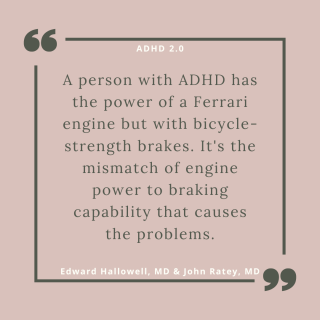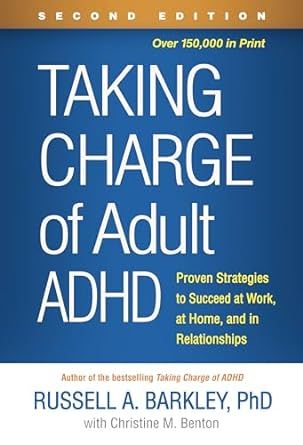ADHD
Relationship Deficit When There’s Attention Deficit
Foster bonds with friends, family, and colleagues who have ADHD.
Posted March 1, 2024 Reviewed by Ray Parker
Key points
- Recognize adult ADHD symptoms, such as inattentiveness, disorganization, and emotional dysregulation.
- Two authors with attention deficit prefer VAST or "variable attention stimulus trait."
- Recognize the positive aspects of ADHD, such as creativity, risk-taking, and quick thinking.

"It hit me," a man revealed. "When my exasperated wife described our 8-year-old son to the school psychologist, I heard my behavior. She joked about having two boys. She wasn't kidding."
Adult attention deficit hyperactivity disorder (ADHD) became recognized in the 1990s, often discovered with a child's diagnosis.
Real or Exaggerated?
Thirty years ago, the National Institutes of Health (NIH) proved through positron emission tomography (PET) scans that ADHD was neurologically based and very real. It's officially ADHD, specified by a type: inattentive, hyperactive, or the combined type.
Driven From Distraction, by Edward M. Hallowell, M.D. and John J. Ratey, M.D., educated us then. In ADHD 2.0, they outline decades of science and strategies. They do know. They've each dealt with symptoms. Teachers historically recognized the lack of attention and self-control. Parents, friends, and ultimately, partners now hold equally important insights as pivotal players.

Growing With, Not Out of ADHD
"The partner of an adult with ADHD is often the more reliable historian," said Gina Pera, author of Is It You, Me, or Adult ADHD? She created the ADHD Partner Survey to research all aspects of it.
Pera found those with ADHD (ADHDers) tended to lose track of priorities, miss deadlines, or arrive late to events. They couldn't initiate or complete tasks nor manage finances well, were chronically disorganized, zoned out, lost tempers, and weren't always fully present in relationships.
Problematic Patterns Set In
Top authors point to troubling dynamics when dating or maintaining relations. An over or under-function dynamic takes root when one partner fails to uphold their share of the financial, household, or parenting tasks. Hence, the non-ADHD spouse ends up with added burdens. They feel like the parent to an adult, burn out faster, and pay an emotional price.
So that one doesn't take on too much, each should acquire life skills, like getting up and going, being organized for work or school, having a calendar or notebook for life's details, counseling, and medical management.
Sometimes, the spouse with ADHD strains the budget with missed appointments, late fees, and overlooked bills.
Choose the Right Advice and Seek Help
Since there's no shortage of resources, I refer clients to those backed by research and quality anecdotes, such as the experts mentioned here.

Russell Barkley, Ph.D., a neuropsychologist with an illustrious career, writes prolifically about the symptoms, challenges, and disparities. One newer tome is Taking Charge of Adult ADHD: Proven Strategies to Succeed at Work, at Home, and in Relationships.
ADHD is not a curse. Entertainers have upstaged one another with quirky talents, quick wit, and the lack of reserve needed for such work. Sports legends learn and act kinesthetically at the pool, gymnastic studio, and football fields. Think Trevor Noah, Mark Ruffalo, Emma Watson, Justine Timberlake, Michael Phelps, Simone Biles, Terry Bradshaw.
Some great companies were founded with risk-taking tolerance for uncharted paths. James Carville led a successful presidential campaign. Dav Pilkey created children's books despite ADHD and dyslexia. Astronaut turned U.S. Senator Scott Kelly believes he had undiagnosed ADHD before it had been researched.
Tips to Succeed in Life
We live when accommodations are at the ready to keep us on track. Those who know or love someone with ADHD will recognize the hyperfocus, especially with a new job or hyper-fixation when first dating someone. Still, strategies will help as focus, and fixations fade:
- Keep a journal. Barkley writes, "Smartphones seem like an obvious choice…but people are likely to use and remember a small pocket journal." Keep it close, in a purse or briefcase outer pocket. Write things down. Refer to it often.
- Accept feedback. "Limited self-regulation can make interactions challenging," Barkley writes. "The mere fact that you've been exposed to a lot of criticism, possibly for most of your life, can make you touchy…." Hallowell and Ratey refer to this as exquisite rejection sensitivity when overreacting and perceiving putdowns.
- Deliver feedback in the soft startup, introducing a request with an I-message with a positive need. It may contain a compliment, such as, "I know you're really good at X, so I wonder if you could please X."
- Parse information in bits or write lists. This helps ADHDers to hear better. Reflective listening, whereby you repeat what a partner says, validates the message was received correctly.
- Make plans and reminders visible. Use a kitchen whiteboard to write what's for dinner, grocery lists, or healthy snacks on hand.
- Manage impulses and delay gratification. Hallowell and Ratey write that ADHDers are short on patience and high on impulsivity, yet "creativity is impulsivity gone right." There's an itch to change things in an ordinary, less stimulating life, especially as folks age. That can lead to regrettable purchases or lifestyle changes.
- Direct that itch into major achievements or creations while curbing quick decisions. If you endeavor on the right creative outlet, one with forethought, if you start a business or side gig, write a book, plant a garden—you can scratch that itch rather than develop bad habits or addictive compulsions (alcohol, drugs, gambling, screen time, spending, or risky sex).
- Work on 0-60 anger. Being emotional may make people act silly or melodramatic, which leads to laughter, but uncontrolled anger threatens relationships the most. Counseling to learn coping strategies helps.
- Read body and facial cues and tones of voice to detect emotions. Learn to adjust accordingly, says Barkley. This affects not only intimate relations but also friends and family, who feel overlooked, unremembered, or taken for granted.
- Rein in defensiveness. There's a penchant for blame with ADHD based upon "a general inability to observe oneself accurately, which naturally leads to more externalizing, since you truly do not see the role you play in a problem," state Hallowell and Ratey. You are non-stop talking, having the last word, and arguing points beyond a conversation's capacity tax relationships.
- Take care of your physical health. Follow a nutritious diet, exercise to burn off frustrations, lower anxiety, naturally elevate mood and get enough rest at night.
- Involve those who know you best in your diagnosis and treatment. A renowned physician explained: People who live with you see you more objectively, in different ways than you see yourself. If a clinician gives you rating scales or questionnaires, they'll often have one for a parent who knew your behavior in youth or a spouse who lives with you now. Don't overlook this meaningful input.
To find a therapist, visit the Psychology Today Therapy Directory.
Copyright © 2024 by Loriann Oberlin, MS
References
Taking Charge of Adult ADHD: Proven Strategies to Succeed at Work, at Home, and in Relationships by Russell Barkley, PhD with Christine M. Benton (New York: The Guilford Press, 2022)
ADHD 2.0: New Science and Essential Strategies for Thriving with Distraction—from Childhood Through Adulthood by Edward M. Hallowell, MD and John J. Ratey, MD (New York: Ballantine Books, 2021)
Is It You, Me, or Adult ADHD? by Gina Pera (Chicago: Alarm Press, 2008)


